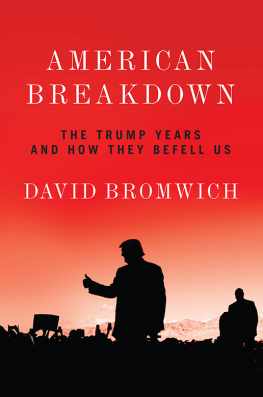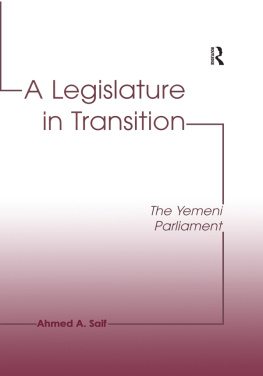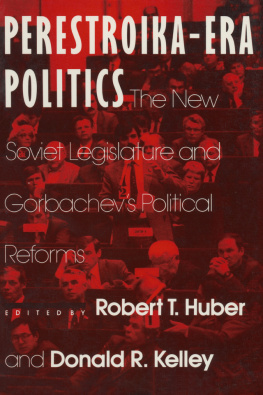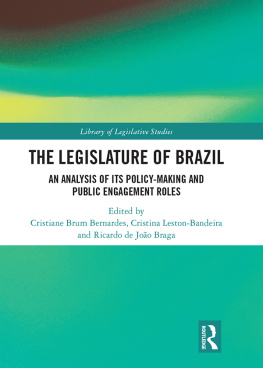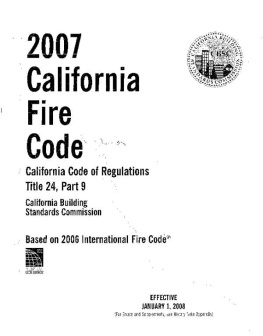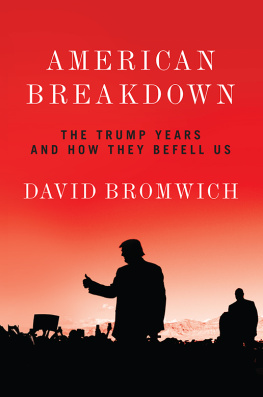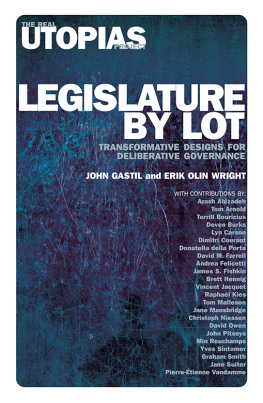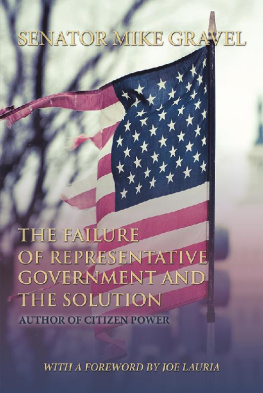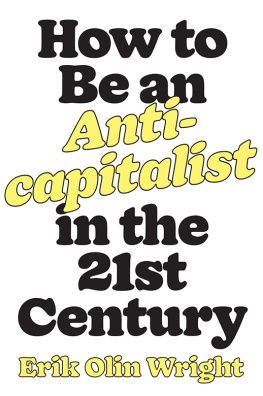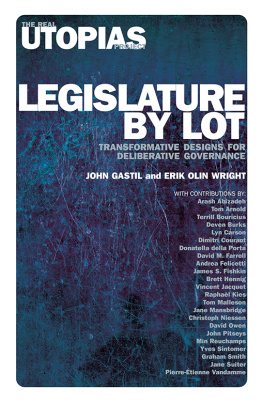Contents

AMERICAN BREAKDOWN
AMERICAN BREAKDOWN
The Trump Years and How They Befell Us
David Bromwich

First published by Verso 2019
David Bromwich 2019
Earlier versions of the chapters originally appeared in the following publications, to which author and publisher would like to express their gratitude: Chapter 1, New York Review of Books, November 20, 2008; Chapter 2, Harpers Magazine, June 2015; Chapter 3, London Review of Books, February 16, 2017; Chapter 4, London Review of Books, July 13, 2017; Chapter 5, London Review of Books, August 9, 2018; Chapter 6, London Review of Books, March 7, 2019; Appendix A, New York Review of Books, November 10, 2016; Appendix B, New York Review of Books, April 10, 2017; Appendix C, Guardian, May 18, 2017
All rights reserved
The moral rights of the author have been asserted
1 3 5 7 9 10 8 6 4 2
Verso
UK: 6 Meard Street, London W1F 0EG
US: 20 Jay Street, Suite 1010, Brooklyn, NY 11201
versobooks.com
Verso is the imprint of New Left Books
ISBN-13: 978-1-78873-726-5
ISBN-13: 978-1-78873-728-9 (US EBK)
ISBN-13: 978-1-78873-727-2 (UK EBK)
British Library Cataloguing in Publication Data
A catalogue record for this book is available from the British Library
Library of Congress Cataloging-in-Publication Data
Names: Bromwich, David, 1951 author.
Title: American breakdown : the Trump years and how they befell us / David Bromwich.
Description: London ; Brooklyn, NY : Verso, [2019] | Includes index.
Identifiers: LCCN 2019006674| ISBN 9781788737265 (hardback : alk. paper) | ISBN 9781788737272 (UK ebk.) | ISBN 9781788737289 (US ebk.)
Subjects: LCSH: Trump, Donald, 1946 | United StatesPolitics and government21st century. | Political cultureUnited StatesHistory21st century.
Classification: LCC E912 .B76 2019 | DDC 973.933092dc23
LC record available at https://lccn.loc.gov/2019006674
Typeset in the UK by Biblichor Ltd, Edinburgh
Printed and bound by CPI Group (UK) Ltd, Croydon, CR0 4YY
To Winifred Amaturo
When there was democracy, it was necessary to understand the character of the masses and how to control them. When the senate was in power, those who best knew its mindthe mind of the oligarchswere considered the wisest experts on contemporary events. Similarly, now that Rome has virtually been transformed into an autocracy, the investigation and record of these details concerning the autocrat may prove useful. Indeed, it is from such studiesfrom the experience of othersthat most men learn to distinguish right and wrong, advantage and disadvantage. Few can tell them apart instinctively.
Tacitus, Annals of Imperial Rome
Contents
This book is sent to press as the United States embarks on the third year of the Trump presidency; and, in the nature of the man and his government, a summary view is liable to mislead; for we are living with government by fiat, government by frenzy. The pace is relentless, there are no shock absorbers, and it takes luck as well as ingenuity to pick out the details that matter. What one can offer therefore is a series of contemporaneous snapshots, for the value they may carry as present history. The chapters on Trump have the character of a political diary; they are dated accordingly and owe their interest to the record they keep of impressions marked by their moment. The chapters on Trumps immediate predecessors make a slightly weightier retrospective claim. The consideration of Cheney and Bush was written just three months before the end of their second term, and Obama was a lame-duck president facing a united Republican Congress when I looked back in the spring of his seventh year. But Donald Trump is regarded by many people as a distinct phenomenon, an aberration that raises an urgent and unprecedented challenge. How did it happen?
You can take the story back to the mid-1930s, when the breakdown of constitutional democracy had already occurred in Italy and Germany and it was a fair question whether American democracy would survive the depression. But the political conditions of our crisis were put in place fifty-five years ago, with the expansion of the Vietnam War on a manufactured pretext: a spectral attack on two US ships and the Senate approval of the Gulf of Tonkin Resolution. The exposure of that deception, in the Pentagon Papers and elsewhere, prompted Americans in large numbers to suspect that their government couldnt be trusted. At the same time, elected representatives continued to cede enormous and ever-augmenting power to the presidency. In this subversion of constitutional balance, congressional majorities (wielded by both parties at different times) were guilty of constant and active complicity. Richard Nixon persisted in and secretly expanded the policy of Lyndon Johnson: bombing, defoliating, killing Vietnamese and requiring Americans to be killed. He defended the war with a mendacity and prosecuted it with a brutality as great as Johnsons, and with the same ultimate impotence. By the time of the US withdrawal in 1973which coincided with the Watergate revelations and was soon followed by the exposure by a Senate committee of the long history of abuse of power at the CIAthe government itself was an object of thoroughgoing distrust. The presidency was as strong as ever.
To meet the oil crisis of the 1970s, President Carter promulgated a doctrine of US national interest in the Persian Gulf. It began to seem that the political business of the United States was congruent with the presidency, and the proper extent of American sovereignty coincided with the reach of American power. Ronald Reagan won the election of 1980 by portraying Carter as a weak leader, especially weak in his lack of concern with preparedness, a charge substantiated by Carters willingness to give the Panama Canal to Panama. This was the same strategy that John Kennedy had used against Nixon in 1960, with his talk of the missile gap, and that George W. Bush would deploy against John Kerry in 2004. Discussion of foreign affairs since 1945a period when the United States never declared a warhas been almost exclusively centered on war and the preparations for war. Always at the heart of such discussions is the political stance of the president.
No one did as much as Reagan to bend the popular language in which Americans think about government. Because of Reagans simple faith and his genius as a salesman, that language, for a long generation now, has been centrally concerned with the rejection of government; with what every American should want to do and be able to do without any help from the government. It was as if, after the Vietnam War and in denial of the discouragement it brought, the American Dream gave birth to Reagan. Reagan, in turn, gave a delusionary afterlife to the dream. As an avuncular and beloved folk politician, he could seem a successor to Franklin Roosevelt; but it was a hollow imitation, cobbled together with the barest pretense of political understanding. An agreeable social type who felt no obligation to master the details of his own policies, Reagan opened up the possibility of the president-as-front-man. His successors in that job description have been George W. Bush and, in certain respects, Donald Trump: in the case of Bush, the engine in the rear was Vice President Cheney; in the case of Trump, the front itself is so erratically changeable that no driver seems able to master it for long. Reagans casual contempt for government was of course an offense to the spirit of the Constitution; but as the promoter of a money-friendly attitude, he was a champion without parallel in American politics. He liked to sayit was a crowd-pleasing line for conservativesThe nine most terrifying words in the English language are Im from the government, and Im here to help. That put the fantasy in a nutshell: if and when you realized the dream in your own life, it must have happened by your efforts alone. People could adopt the attitude without a second thought about the various good and useful jobs any modern government is relied on to carry out: food inspection, weather warnings, disaster relief, interstate highways, airport security, the postal system, public schools, emergency medical aid. Reagans order to remove the solar panels installed by President Carter on the roof of the White Housebecause they were a cosmetic nuisancecan stand for the irresponsibility with which his presidency launched the United States in a direction we have followed ever since. Winning the Cold Waran event (if it was an event) that many people believe Ronald Reagan brought about alonegave his posthumous fame an enchantment peculiarly difficult to challenge.

